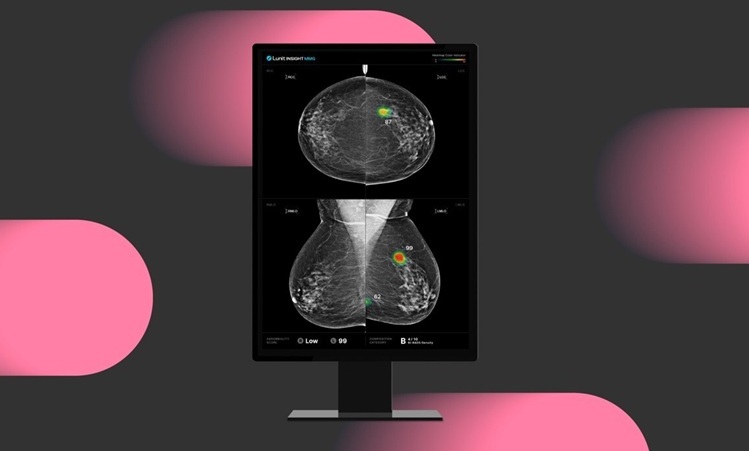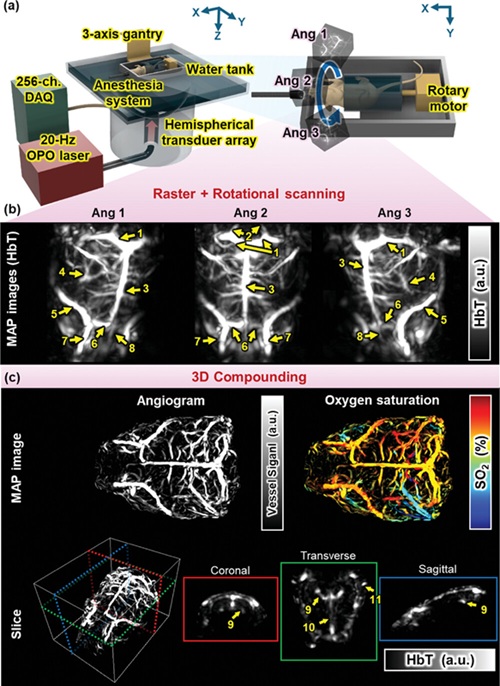Portable PET Scanner to Detect Earliest Stages of Alzheimer’s Disease
|
By MedImaging International staff writers Posted on 05 Nov 2024 |

During a positron emission tomography (PET) scan, a radioactive tracer is injected into the bloodstream, where it accumulates in the targeted tissue and emits signals that the PET scanner detects. These signals are then converted into images. However, current PET scanners often suffer from low spatial resolution, which limits image quality and hinders the reliable quantification of biomarkers such as amyloid plaques and tau tangles—protein aggregates associated with Alzheimer’s disease. Researchers are now developing a portable, high-resolution PET scanner capable of detecting the early stages of Alzheimer’s disease.
This new PET scanner, being created by researchers at Weill Cornell Medicine (New York, NY, USA), features an upright design that allows patients to sit in a chair that moves with the unit, enhancing portability and accessibility. This innovation enables the scanner to be transported to medical centers lacking advanced brain imaging technologies, thereby extending high-quality care to a more diverse patient population. In a proof-of-concept study, the team developed the Prism-PET scanner, which boasts the highest resolution of any PET scanner to date. This device can identify "hot spots," or areas with elevated concentrations of the radioactive tracer, that are less than 1 mm in diameter when tested with brain phantoms, which mimic human tissue. In contrast, commercially available PET scanners produce images with considerably less detail.
The researchers plan to utilize Prism-PET to identify tau tangles in the transentorhinal cortex, a critical hub for memory, navigation, and temporal perception. This area is the first to show the presence of tau tangles, signaling the onset of Alzheimer’s disease even before the appearance of symptoms like mild cognitive impairment. To enhance imaging capabilities further, the scientists will refine motion compensation techniques to minimize blurring in PET images caused by patient movement. Following the FDA's 2023 approval of lecanemab, a monoclonal antibody that targets amyloid plaques and is currently the only treatment demonstrated to slow Alzheimer’s progression, the demand for PET imaging has surged. The scanner's compact design means that even community hospitals and other healthcare facilities do not require a dedicated space for brain PET imaging. Additionally, one possibility for meeting this demand includes using the scanner in a mobile unit, such as a truck, that can travel to underserved areas.
“Our overall goal is two-fold—having the highest performance brain PET scanner available, while also addressing its accessibility and portability to serve the community,” said Dr. Amir H. Goldan, associate professor of electrical engineering in radiology at Weill Cornell Medicine. “The earlier you can diagnose Alzheimer's disease, the better the chances of therapy being effective.”
Related Links:
Weill Cornell Medicine
Latest General/Advanced Imaging News
- AI Model Significantly Enhances Low-Dose CT Capabilities
- Ultra-Low Dose CT Aids Pneumonia Diagnosis in Immunocompromised Patients
- AI Reduces CT Lung Cancer Screening Workload by Almost 80%
- Cutting-Edge Technology Combines Light and Sound for Real-Time Stroke Monitoring
- AI System Detects Subtle Changes in Series of Medical Images Over Time
- New CT Scan Technique to Improve Prognosis and Treatments for Head and Neck Cancers
- World’s First Mobile Whole-Body CT Scanner to Provide Diagnostics at POC
- Comprehensive CT Scans Could Identify Atherosclerosis Among Lung Cancer Patients
- AI Improves Detection of Colorectal Cancer on Routine Abdominopelvic CT Scans
- Super-Resolution Technology Enhances Clinical Bone Imaging to Predict Osteoporotic Fracture Risk
- AI-Powered Abdomen Map Enables Early Cancer Detection
- Deep Learning Model Detects Lung Tumors on CT
- AI Predicts Cardiovascular Risk from CT Scans
- Deep Learning Based Algorithms Improve Tumor Detection in PET/CT Scans
- New Technology Provides Coronary Artery Calcification Scoring on Ungated Chest CT Scans
- Deep Learning Model Accurately Diagnoses COPD Using Single Inhalation Lung CT Scan
Channels
Radiography
view channel
Higher Chest X-Ray Usage Catches Lung Cancer Earlier and Improves Survival
Lung cancer continues to be the leading cause of cancer-related deaths worldwide. While advanced technologies like CT scanners play a crucial role in detecting lung cancer, more accessible and affordable... Read more
AI-Powered Mammograms Predict Cardiovascular Risk
The U.S. Centers for Disease Control and Prevention recommends that women in middle age and older undergo a mammogram, which is an X-ray of the breast, every one or two years to screen for breast cancer.... Read moreMRI
view channel
Ultra-Powerful MRI Scans Enable Life-Changing Surgery in Treatment-Resistant Epileptic Patients
Approximately 360,000 individuals in the UK suffer from focal epilepsy, a condition in which seizures spread from one part of the brain. Around a third of these patients experience persistent seizures... Read more
AI-Powered MRI Technology Improves Parkinson’s Diagnoses
Current research shows that the accuracy of diagnosing Parkinson’s disease typically ranges from 55% to 78% within the first five years of assessment. This is partly due to the similarities shared by Parkinson’s... Read more
Biparametric MRI Combined with AI Enhances Detection of Clinically Significant Prostate Cancer
Artificial intelligence (AI) technologies are transforming the way medical images are analyzed, offering unprecedented capabilities in quantitatively extracting features that go beyond traditional visual... Read more
First-Of-Its-Kind AI-Driven Brain Imaging Platform to Better Guide Stroke Treatment Options
Each year, approximately 800,000 people in the U.S. experience strokes, with marginalized and minoritized groups being disproportionately affected. Strokes vary in terms of size and location within the... Read moreUltrasound
view channel
Tiny Magnetic Robot Takes 3D Scans from Deep Within Body
Colorectal cancer ranks as one of the leading causes of cancer-related mortality worldwide. However, when detected early, it is highly treatable. Now, a new minimally invasive technique could significantly... Read more
High Resolution Ultrasound Speeds Up Prostate Cancer Diagnosis
Each year, approximately one million prostate cancer biopsies are conducted across Europe, with similar numbers in the USA and around 100,000 in Canada. Most of these biopsies are performed using MRI images... Read more
World's First Wireless, Handheld, Whole-Body Ultrasound with Single PZT Transducer Makes Imaging More Accessible
Ultrasound devices play a vital role in the medical field, routinely used to examine the body's internal tissues and structures. While advancements have steadily improved ultrasound image quality and processing... Read moreGeneral/Advanced Imaging
view channel
AI Model Significantly Enhances Low-Dose CT Capabilities
Lung cancer remains one of the most challenging diseases, making early diagnosis vital for effective treatment. Fortunately, advancements in artificial intelligence (AI) are revolutionizing lung cancer... Read more
Ultra-Low Dose CT Aids Pneumonia Diagnosis in Immunocompromised Patients
Lung infections can be life-threatening for patients with weakened immune systems, making timely diagnosis crucial. While CT scans are considered the gold standard for detecting pneumonia, repeated scans... Read moreImaging IT
view channel
New Google Cloud Medical Imaging Suite Makes Imaging Healthcare Data More Accessible
Medical imaging is a critical tool used to diagnose patients, and there are billions of medical images scanned globally each year. Imaging data accounts for about 90% of all healthcare data1 and, until... Read more
Global AI in Medical Diagnostics Market to Be Driven by Demand for Image Recognition in Radiology
The global artificial intelligence (AI) in medical diagnostics market is expanding with early disease detection being one of its key applications and image recognition becoming a compelling consumer proposition... Read moreIndustry News
view channel
GE HealthCare and NVIDIA Collaboration to Reimagine Diagnostic Imaging
GE HealthCare (Chicago, IL, USA) has entered into a collaboration with NVIDIA (Santa Clara, CA, USA), expanding the existing relationship between the two companies to focus on pioneering innovation in... Read more
Patient-Specific 3D-Printed Phantoms Transform CT Imaging
New research has highlighted how anatomically precise, patient-specific 3D-printed phantoms are proving to be scalable, cost-effective, and efficient tools in the development of new CT scan algorithms... Read more
Siemens and Sectra Collaborate on Enhancing Radiology Workflows
Siemens Healthineers (Forchheim, Germany) and Sectra (Linköping, Sweden) have entered into a collaboration aimed at enhancing radiologists' diagnostic capabilities and, in turn, improving patient care... Read more


















